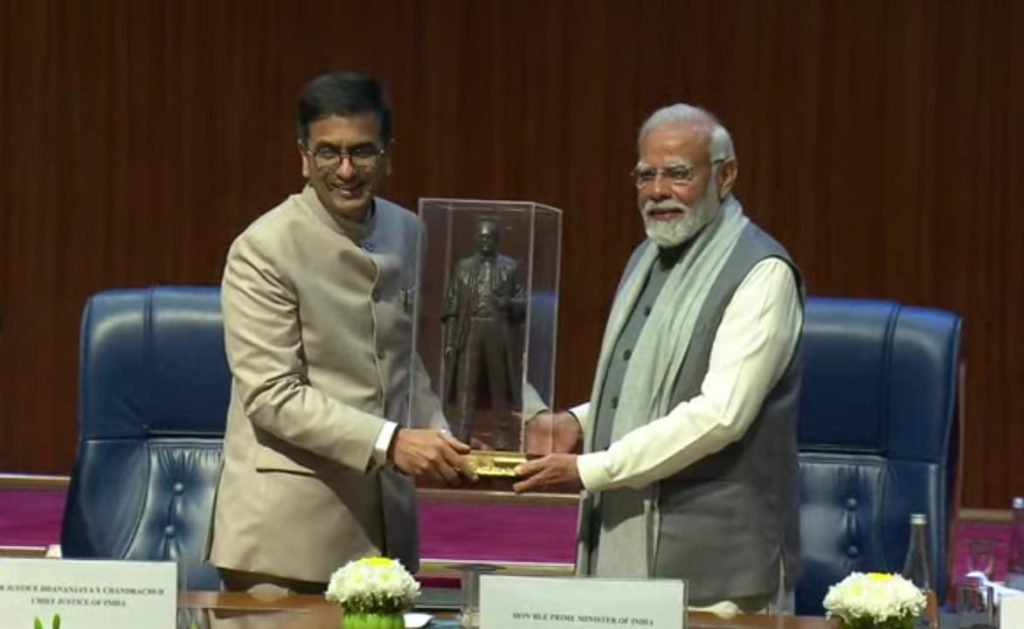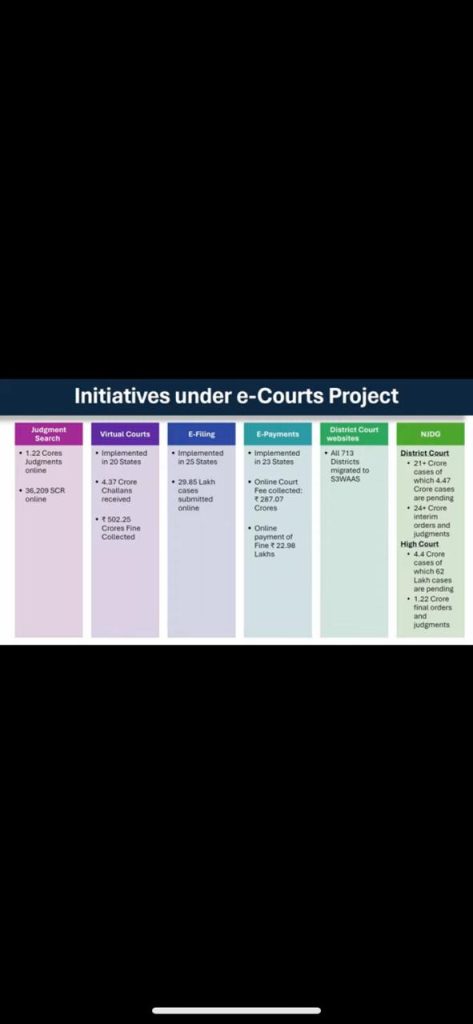Prime Minister Narendra Modi on Sunday said the Supreme Court has strengthened the vibrant democracy of Bharat in the past 75 years by protecting the individual rights of citizens and their freedom of speech, giving a new direction to the socio-political scenario of the country.
Attending the Diamond Jubilee celebrations at the Additional Building Complex of the Apex Court, the Prime Minister said that every organisation of the country was working with the aim of developing itself in the next 25 years, when Bharat will complete 100 years of independence.
Mr Modi said today’s economic policies will form the basis of a bright future for India and today’s laws will strengthen the future of the country, adding that the judgements delivered by the top court of the country in the next 25 years will play a crucial role in India’s transformation by 2047.
He said the whole world was looking at India, it was important for India to take advantage of every opportunity, adding that major reforms were taking place in the country today.
As per Mr. Modi, Indian citizens deserved the ease of justice and the Supreme Court was the prime medium for it. The entire judicial system depended on the guidance of the Apex Court.
Speaking about the initiatives taken by his government, the Prime Minister said the government was promoting alternative dispute resolution to reduce the burden on judiciary.
He said he was conscious of difficulties being faced in the present Supreme Court building. For enhancing the court’s complex, a fund of Rs 800 crore has been sanctioned, he added.
He said the ease of living, doing business, travel, communication and ease of justice were all priorities for India.
Launching the new initiatives of the Supreme Court, he said the courts should be accessible to the last man standing on the last corner of the country.

Mr Modi said his address being simultaneously interpreted in English with the help of Artificial Intelligence for the convenience of people present on the occasion, showed what technology could do for people and for the justice delivery system.
He said the government was working towards reforming old colonial laws such as the criminal laws. Due to these changes, the legal policing and investigative systems of the country have entered into a new phase.
Noting that capacity building has been started in advance, the Prime Minister requested the Supreme Court to also come forward with a similar capacity building exercise.
The Supreme Court celebrated 75 years of its inception with a grand event at the Additional Building Complex of the Apex Court, which was inaugurated by Prime Minister Narendra Modi.
Mr Modi launched citizen-centric information and technology initiatives on the occasion. These include Digital Supreme Court Reports (Digi SCR), Digital Courts 2.0 and new website of the Supreme Court.

The Digital Supreme Court Reports (SCR) will make the Apex Court judgments available to the citizens of the country free of cost in electronic format. All 519 volumes of the Supreme Court reports since 1950, covering 36,308 cases, shall be available in a digital format, bookmarked, user-friendly, and with open access.
Digital Courts 2.0 application is a recent initiative under the e-Courts project to make court records available to the Judges of district courts in an electronic form. This is coupled with the use of artificial intelligence (AI) for transcribing speech to text on a real time basis.
The Prime Minister also launched the new website of the Supreme Court. The new website is in bilingual format in English and Hindi and has been redesigned with a user-friendly interface.
Chief Justice of India DY Chandrachud, Chief Justice of Bangladesh Obaidul Hassan, Chief Justice of Bhutan Chogyal Dago Rigzdin, Chief Justice of Mauritius Rehana Bibi Mungly-Gulbul, Chief Justice of Nepal Bishowambhar Prasad Shreshtha and Chief Justice of Sri Lanka Jayantha Jayasuriya graced the occasion.
Supreme Court judge Justice Sanjiv Khanna, Law Minister Arjun Ram Meghwal, Attorney General R Venkataramani, President of the Supreme Court Bar Association Adish Aggarwala and Chairman of the Bar Council of India Manan Kumar Mishra, among others, were present on the occasion.
The Supreme Court of India was inaugurated in the Parliament Building on January 28, 1950. Back then, there was no separate building for the Apex Court, which functioned from the Parliament Building then.
The original Constitution of 1950 had a Chief Justice of India and seven puisne judges and had left it to Parliament to increase the number.
It is pertinent to note that since the inception, the Parliament has increased the number of judges six times since 1950 to the current strength of 34 in 2019.
The top court of the country saw several technological changes, ranging from litigant-friendly facilities, with the hybrid hearing system being one of the key achievements for listing of cases.
In 2023, the cases have also been streamlined, along with smart and paperless courts.
Last year saw the use of Artificial Intelligence (AI) by the Supreme Court for transcription being recognised in UNESCO’s Global Toolkit on Al and the Rule of Law for the Judiciary.


